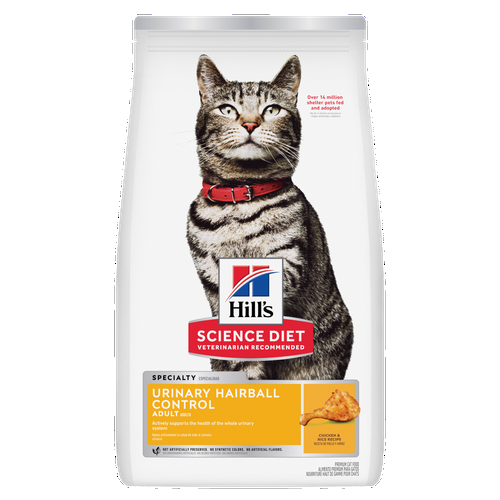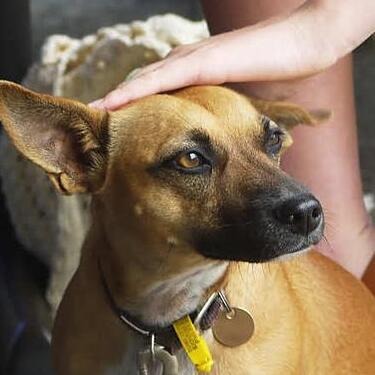
-
Find the right food for your petTake this quiz to see which food may be the best for your furry friend.Find the right food for your petTake this quiz to see which food may be the best for your furry friend.Featured products
 Hill's Science Diet Adult Oral Care Chicken, Brown Rice & Barley Recipe Dog Food
Hill's Science Diet Adult Oral Care Chicken, Brown Rice & Barley Recipe Dog FoodClinically proven kibble technology to reduce plaque & tartar build-up
Shop Now Adult Small & Mini Lamb Meal & Brown Rice Recipe Dog Food
Adult Small & Mini Lamb Meal & Brown Rice Recipe Dog FoodFor the faster metabolism of Small & Mini dogs
Shop Now Adult 7+ Small & Mini Chicken & Brown Rice Recipe Dog Food
Adult 7+ Small & Mini Chicken & Brown Rice Recipe Dog FoodFor the unique nutritional needs of mature Small & Mini dogs
Shop NowFeatured products Adult Urinary Hairball Control Chicken & Rice Recipe Cat Food
Adult Urinary Hairball Control Chicken & Rice Recipe Cat FoodActively supports the health of the whole urinary system
Shop Now Hill's Science Diet Adult Sensitive Stomach & Skin Dog Food
Hill's Science Diet Adult Sensitive Stomach & Skin Dog FoodHighly digestible recipe, gentle on stomachs. Nourishes skin & promotes a lustrous coat
Shop Now Adult Indoor Chicken Recipe Cat Food
Adult Indoor Chicken Recipe Cat FoodSupports energy level and beautiful fur in indoor cats
Shop Now -
Featured articles
 Easy DIY Dog & Cat Toys: Nine of Our Favorites
Easy DIY Dog & Cat Toys: Nine of Our FavoritesBrowse this comprehensive guide for several of our favorite DIY dog and cat toys that are sure to put a little pep in your pet's step.
Read More 15 Pet-Friendly Cities Ideal for a US Road Trip
15 Pet-Friendly Cities Ideal for a US Road TripCheck out our list of pet-friendly U.S. cities that are excellent travel options, offering off-leash dog parks and pet-friendly restaurants & hotels.
Read More My Pet Ate a Lizard — What Should I Do?
My Pet Ate a Lizard — What Should I Do?Learn what to do if your pet eats a lizard, including whether they can be toxic and symptoms to keep an eye on when they've swallowed one.
Read More -


If you've encountered cat puke in your house before, you're not alone. An upset cat stomach is one of the most common reasons that cats are taken to the veterinarian. Read on to learn common causes of cat upset stomach and tips to make your kitty feel better.
Why Does My Cat Have an Upset Stomach?
There are many reasons why your cat could have an upset stomach. If your cat is especially sensitive, even a slight change in her food could be the culprit.
Causes can be sorted into two types — conditions inside and outside of the gastrointestinal (GI) system.
Anything that inflames the GI system can cause a cat upset stomach. This includes:
- Parasites
- Intestinal foreign bodies, such as string
- Cancer
- Inflammatory bowel disease (IBD)
- Hairballs
- Ingestion of toxic substances
- Stomach ulcers
- Food sensitivities or allergies
- Bacterial overgrowth
Conditions outside of the GI system that can cause a cat upset stomach include:
- Liver disease
- Kidney disease
- Pancreatitis
- Urinary tract infections
- Hormonal disorders, such as hyperthyroidism or diabetes
- Brain disorders that cause vertigo
- Infections
- Cancer of almost any system
- Pain or stress
If your cat has repeated bouts of diarrhea, vomiting or loss of appetite, you should see your vet as soon as possible.
How Can I Treat My Cat's Upset Stomach?
Treatment for upset cat stomach should target the underlying cause while helping your kitty feel better by reducing nausea and inflammation.
Treatment depends on the specific diagnosis. Treatment for liver disease, for example, is very different from treatment for IBD, which is very different from treatment for intestinal parasites. Surgery or surgical biopsy procedures may be necessary for some situations. Your vet may also recommend lab tests or imaging studies, such as abdominal ultrasounds or X-rays.
While proper treatment must address the underlying cause, it's also important to ease any pain and suffering your kitty is experiencing. Your vet may prescribe anti-nausea medication, which can be administered orally or via injection. Additional medications, such as antacids, antibiotics, dewormers, probiotics, prokinetics or pain medication may be prescribed, depending on your cat's needs.


Tasty Tips
Can the Right Food Help Soothe My Cat's Stomach?
Appropriate nutrition is incredibly important to soothing a cat's upset stomach. A sick or injured GI system is often weakened and unable to digest food normally. Feeding your cat the right food can help speed recovery and minimize pain, nausea and discomfort.
In mild cases, you may be able to improve your cat's symptoms with a change in food alone, like switching to Hill's® Science Diet® Adult Sensitive Stomach & Skin formula.
It can be wise to feed a cat a combination of canned and dry food to provide additional moisture to meals. For more serious conditions, your vet may prescribe a highly digestible therapeutic food, such as Hill's® Prescription Diet® cat food to help soothe and heal the gut.
When in doubt, ask your vet for a dietary recommendation. If you do switch foods, make the change slowly by mixing your cat's old and new foods together for several days.
How Do I Get My Cat With an Upset Stomach to Eat?
It's important that your cat continues to eat regular as prolonged loss of appetite can be harmful to your cat. If your cat doesn't eat, she could develop fatty liver disease, which is potentially fatal, which prolonged anorexia in a cat can be life-threatening.
While working with your vet to control your cat's symptoms with medication, you can also try the following if your cat is turning her nose up at her food:
- Warm her food in the microwave for 10 to 15 seconds — the heat will make it smell more appetizing. Test it before serving her to make sure it isn't too hot!
- Try feeding her canned food if you've been giving her dry food, and vice versa.
- Make the experience more pleasant: Gently speak to her and pet her as you offer food.
If your cat won't eat for more than 48 hours, then it's time to get your vet involved.
While cat upset stomach can be unpleasant for your kitty, it's not unsolvable. Proper veterinary care and nutrition will resolve most cats' tummy issues — and hopefully, save your carpet as well.


Dr. Sarah Wooten graduated from UC Davis School of Veterinary Medicine in 2002. A member of the American Society of Veterinary Journalists, Dr. Wooten divides her professional time between small animal practice in Greeley, Colorado, public speaking on associate issues, leadership, and client communication, and writing. She enjoys camping with her family, skiing, SCUBA, and participating in triathlons.
Related products
Related articles

Put your cat on a diet without them knowing
Our low calorie formula helps you control your cat's weight. It's packed with high-quality protein for building lean muscles, and made with purposeful ingredients for a flavorful, nutritious meal. Clinically proven antioxidants, Vitamin C+E, help promote a healthy immune system.
Put your cat on a diet without them knowing
Our low calorie formula helps you control your cat's weight. It's packed with high-quality protein for building lean muscles, and made with purposeful ingredients for a flavorful, nutritious meal. Clinically proven antioxidants, Vitamin C+E, help promote a healthy immune system.

